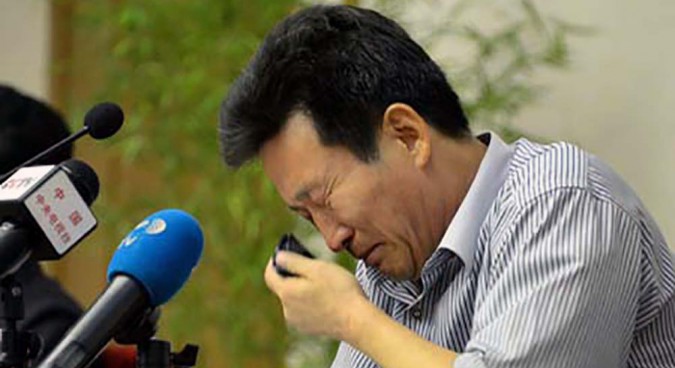Informants target Chinese mobile phone users
Kim Chae Hwan | 2016-07-20 18:00
In an ongoing bid to tighten control on communication with the outside world, North Korean security authorities are actively soliciting informants to arrest users of foreign mobile phones on "espionage charges."
The informants are tasked with monitoring fellow residents suspected of placing international calls and reporting their findings back to the local State Security Department (SSD) unit, a source in North Hamgyong Province told Daily NK on Tuesday.
“Informants employ different tactics to try to induce confidants to place calls to the South, like encouraging them to call their loved ones and check in or ask for money in the case of financial troubles,” she explained. The goal, she added, is for the SSD officers to arrive on the scene and arrest the transgressors for “attempting to overthrow the regime.”
This method is not new. SSD personnel routinely employ threatening tactics to coerce their informants to report on the perceived illicit acts of subjects under their monitoring purview.
Informants, in most cases, comply with these terms in return for favorable treatment in their own criminal cases. For example, agents may offer early release to prisoners who are in re-education camps for lighter crimes if they agree to work as moles.
“These informants end up with no choice but to monitor their neighbors’ every move while pretending to treat them like family. Residents in the ‘hostile class’ [within the songbun classification system, which is based on family political background and loyalty] typically top the list for increased surveillance,” she explained.
A separate source in North Hamgyong Province reported a recent incident to highlight how duplicitous these informants can be. When a close friend of woman in her 50s, known to be placing phone calls to South Korea on a Chinese cell phone, reported her activity to the SSD, “the community was shocked,” he said. “The two of them were so close.”
Luckily, the woman evaded espionage charges and arrest. However, “the sentiment on the ground is that there’s no one left to trust,” the source said. “People are worried the state is succeeding in tearing us apart from the inside.”
Thus far, patchy implementation, bribery, and residents’ intuition counter the efficacy of the leadership’s efforts to stymie the pervasive use of Chinese mobile phones by North Koreans in border regions.
Nonetheless, tension naturally runs high when clampdowns are underway. “Those who depend on placing outside calls to make a living are getting by day to day at the moment, never forgetting the inherent risks involved,” the source said.
The same could be said for security forces desperate to avoid implication. As previously reported by Daily NK, an Ministry of People’s Security official in Ryanggang Province was arrested for pocketing bribes to turn a blind eye to residents placing phone calls to South Korea.
*Translated by Jiyeon Lee
_________________________________________
Crackdown targets messaging app users
Kim Chae Hwan | 2016-06-07 00:45
North Korean users of foreign messenger applications such as Kakao Talk, Line, and WeChat will be arrested on the spot on suspicion of espionage, according to a new order handed down from the authorities. Sources inside the country interpret the move as Kim Jong Un's aggressive reaction to the capability of Chinese cellphones to facilitate the import and export of information into the isolated country.
As recently reported by Daily NK, the North Korean authorities have ramped up efforts to label Chinese cellphone users as traitors and pursuing strict punishments against them. To this end, North Korean authorities doubled down on the use of signal detectors to trace illicit international calls and zero in on the location of foreign phone users.
However, the messenger apps allow users to circumvent detection by this equipment, prompting the regime to respond with new threats specifically targeting users of these communication applications.
“A measure has been enacted that orders the immediate arrest of ‘traitorous’ residents who use foreign messenger applications. The regime further threatened that those caught will not be offered clemency under any condition,” a source in Ryanggang Province told Daily NK on June 2.
“Offenders who are apprehended will be processed according to the discretion of the arresting agency-- i.e. the State Security Department or the Ministry of People’s Security. Those taken in will be charged with espionage associating with the enemy and dispatched to a political prison camp.”
According to the source, the regime first began showing interest in foreign messenger apps in May 2014. At the time, residents who continuously used Chinese cellphones were arrested, and through the course of the investigation process, the authorities discovered that information was being sent back and forth through apps such as the South Korean texting service Kakao Talk.
“At that time, the authorities decided to define such activity as espionage and handed down an order to strictly punish offenders,” he said.
The crackdown on messenger services therefore strengthened from that moment on. The South Korean service Line and the Chinese service WeChat also became targets of surveillance at that point.
“These days, Line and Kakao Talk are explicitly mentioned in lectures [routinely delivered to residents by the authorities]. That’s how serious the crackdown has become,” a separate source in Ryanggang Province said.
This, he went on to say, is unprecedented--hitherto, there had been no mention of foreign cell phone applications at official lectures. Such a proactive measure reveals Kim Jong Un’s acute awareness of the adverse effects foreign information and defections pose to the stability of the regime, further highlighted by his blustery accusation that South Korea kidnapped 13 North Korean restaurant workers who recently escaped their posts in China and fled to seek asylum in the South.
*Translated by Jonathan Corrado












